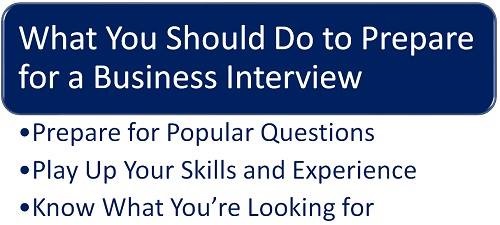No matter how good a student you are or how much you may try to take things in stride, interviewing for your first real job in the business world can leave you feeling anxious. It’s natural to be nervous about a big opportunity like an interview for a job you really want, especially when you don’t yet have much experience interviewing for business jobs. As you prepare for your interview, practicing your answers to the most common interview questions can help you be prepared to answer those questions thoroughly and succinctly while highlighting the skills and experiences that make you a great candidate. It is also crucial to know what you are looking for in your first business job, both for your own career planning and also to convince the right employer that you are the right fit for the job.
Prepare for the Most-Asked Business Interview Questions
At its most basic, an interview of any kind is simply a conversation between two or more people that has a specific purpose. When it comes to a job interview, that purpose is to determine if you are the candidate who best fits the job the employer is looking to fill. Interviewers make that decision based on your answers to questions that they find relevant to understanding your background, skills and personality.
If you give no thought to the questions you will be asked prior to the interview, you may find that remembering all that you want to say is difficult when you’re under pressure. Practicing your responses to popular interview questions is one way to go into your interview with more confidence. Even if the questions that your interviewer asks you aren’t quite the same as the ones you have practiced, spending time prior to the meeting reciting out loud the points that you want to emphasize in the interview can help you feel less like you must come up with answers on the spot.
Which interview questions should you be prepared to answer? For business majors, many of the most common interview questions include basic questions about your background and interests and what you would or have done in specified scenarios. Interviews often start off with the open-ended request “tell me about yourself,” which although simple can leave you feeling flustered if you haven’t decided what points are most important to discuss. Be prepared for questions about why you chose to major in business and what about the company and position appeals to you.
In an interview, your role isn’t only to answer questions, but also to ask insightful questions that will help determine if you are a good fit for the job. This is a good chance to learn about job expectations, how success will be measured and opportunities for growth.
Play Up Your Skills and Experience
As you take part in the conversation that is the job interview, your answers to the questions you are asked to highlight your relevant skills and work experience. Even if you have only recently graduated with your bachelor’s degree in business administration, the experience you gained working on projects in the classroom and through business internship roles outside the classroom is still valuable. Employers want to know that your knowledge isn’t limited to academic subject matter and business theory and that you have practical skills that will make a difference in their company. Talk about the projects you got to be part of during your internship. Highlight both the technical knowledge you gained, like creating and interpreting certain kinds of financial reports or using new types of software, as well as the soft skills you developed, such as business writing or giving presentations.
Extracurricular, volunteer and non-business work experience can also be valuable to an employer, particularly if it shows how you shine as a leader or how you handle conflicts and rise above obstacles to success.
IMAGE SOURCE: Pixabay, public domain
Know What You’re Looking for in a Job
Business administration is a broad field of study. It is important that you determine, both in the course of your job search and during the process of interviewing for a specific job, what you want out of your career. There is no one right answer. If you prefer to work with people and aspire to hold a managerial role eventually, you might make an excellent human resources specialist but find working in an analyst role to be daunting or tedious. On the other hand, if you love working with numbers but are not as enamored with relationship-building efforts, jobs like budget analyst and financial analyst may be preferable to jobs that require a great deal of human interaction and client retention efforts. While it may take some experience to really determine which direction you want to take your career in, the earlier you begin asking yourself what you want from your professional life, the more strategic you can be with your career moves.
Even a job that isn’t in your ideal area of business administration can still teach you valuable skills. Whatever your current position is, make an effort to learn as much from it as possible, and you could be surprised at the opportunities become open to you.
Additional Resources
What Kind of Job Can You Get With a Degree in Business Administration?
What Kind of Job Can You Get With a Degree in Business Management?
What Should You Know When You Interview for a Job With a Degree in Management?



